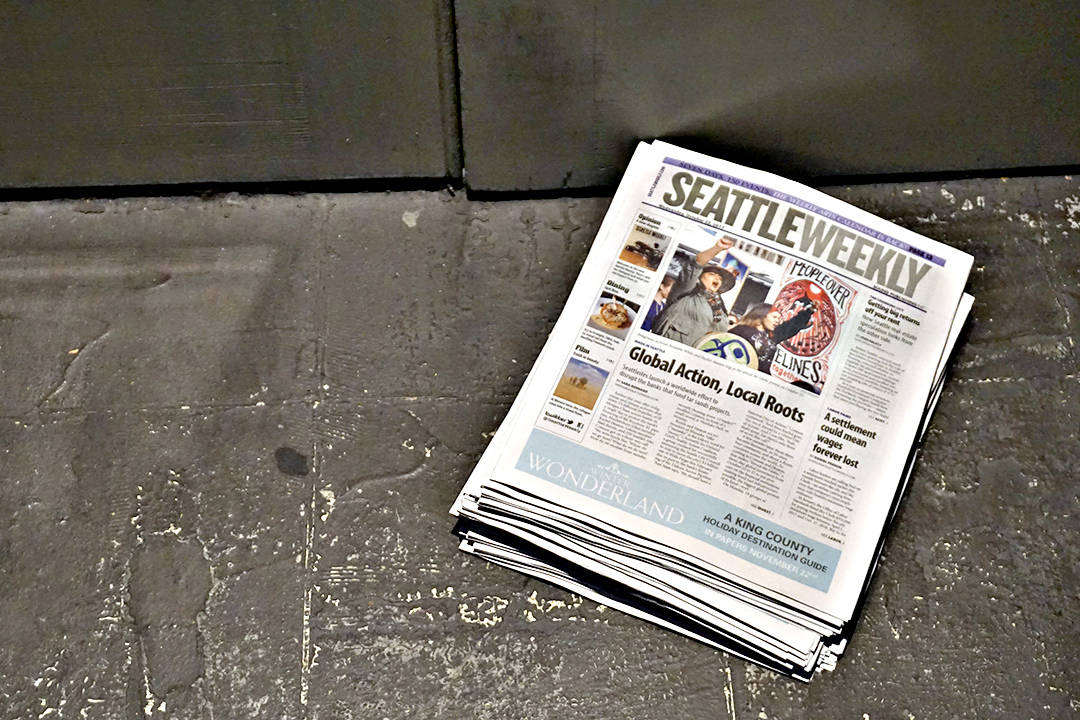It is a striking visual that greets theatergoers filing into the 5th Avenue Theatre for its current production of Man of La Mancha. An impassable, impossibly tall fence stretches across the width of the proscenium, lined at the top with concertina wire, backed by concrete walls that reach for the ceiling. It is a brutal, cold, and dark setting for the theater’s reimagining of the 1964 musical inspired by the 1605 novel Don Quixote de La Manche and its author Miguel de Cervantes—one that invites contemplation in a moment when prison reform is a hot topic, as is President Obama’s failure to shutter the Guantanamo Bay detention center.
For me, the foreboding scene and the story that would unfold within it brought to mind Shaker Aamer, a former prisoner at Guantanamo who also happens to be a fan of the band Whitesnake. It was in that band’s song “Here I Go Again,” blasted at high volume as a form of torture during Aamer’s imprisonment, that he found hope, he told the BBC last December. “The words, it fits me,” he said. “It’s like me again … ‘Here I go again on my own, going down the only road I’ve ever known, like a drifter I was born to walk alone, ’cause I know what it means to walk alone, along the lonely street of dreams, and here I go again,’ and it’s true. It’s just dreams. Dreams that I’ll be home one day.”
The fictional Cervantes is a counterpart to Aamer in this tale, and his story is indeed a dream in the midst of a nightmare, brought to vivid, invigorating life at the hands of director Allison Narver. The musical—with a book by Dale Wasserman, lyrics by Joe Darion, and music by Mitch Leigh—opens as Cervantes (Rufus Bonds Jr.) and his sidekick Sancho (Don Darryl Rivera) are delivered to this holding cell to join a dozen or so other prisoners as they await trial during the Spanish Inquisition, another shameful moment in human history. Cervantes—a poet, actor, and tax collector—is hectored by his fellow prisoners, who decide to put on their own trial. For his defense, Cervantes mounts a play, telling the tale of the delusional would-be knight-errant Don Quixote and his quest for glory.
While the script is unchanged from the original, the modern trappings of this staging extend beyond the concertina wire and concrete that introduce Matthew Smucker’s smart set. The guards are gun-wielding fascist thugs, the machinations of the prison industrial, and the prisoners adorned in the denim and leather of a biker gang. These modern touches, though, are secondary. Once Cervantes’ play within a play begins, brutal reality recedes into the background and gives way to an imaginative staging. Costuming and props by Harmony Arnold are built from scraps of this modern world, but the sum of those everyday objects is fantastical—in particular the brilliantly devised horse and donkey that carry Don Quixote and Sancho on their journey. Likewise, the other prisoners are more than willing to play along and, thanks to the talents of the actors playing them, turn in some brilliant performances—chief among them Nick DeSantis’ turn as the Padre and Nova Y. Payton as love interest Aldonza, a role that gives a too-brief glimpse of the actress’ show-stopping voice early on with “It’s All the Same,” leaving the audience wanting more.
Cervantes and Sancho are the center of this tale, though, and the two actors playing them both put on a convincing performance. As both Cervantes and the delusional knight, Bonds is a convincing eccentric. His deep, commanding voice combined with a wild-eyed self-possession can be frightening, but then it just as easily spills over into an intoxicating determination in the musical’s most recognizable number, “The Impossible Dream (The Quest).” Rivera is a marvel as Sancho, offering surprising moments of comic relief and some truly inspired physical humor. It is that humor, as well as the exuberant choreography by Maria Torres (especially during the “Moorish Dance”), that brings levity to what is, at its core, a very dark story of delusions and dreams and the difficulty in finding the line between the two. 5th Avenue Theatre, 1308 Fifth Ave., 625-1900. $29–$121. Ends Oct. 30.
mbaumgarten@seattleweekly.com








